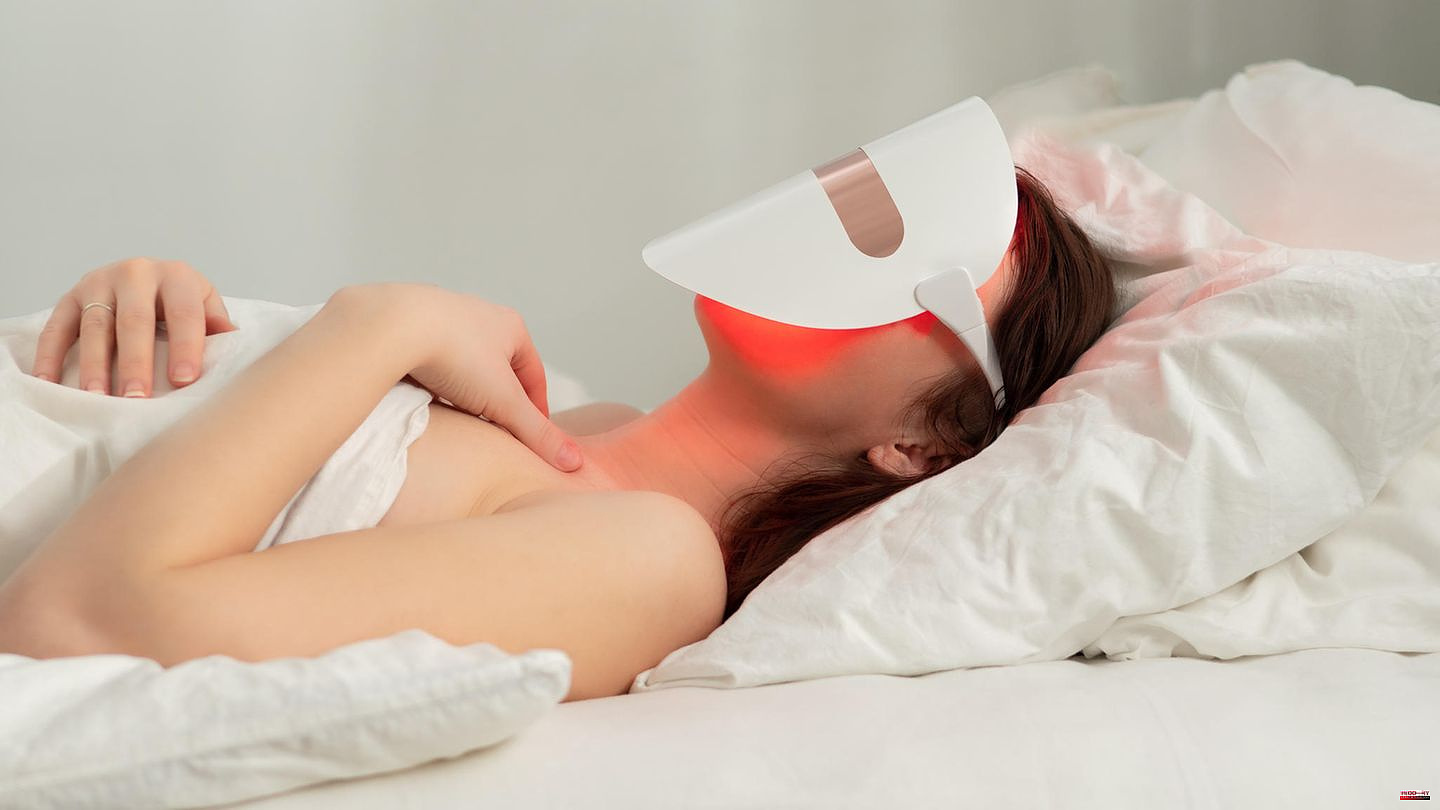Among other things, it is said to alleviate impurities, pigment disorders and irritations, reduce wrinkles and even strengthen the immune system: light therapy is also a popular method in the beauty sector to counteract skin problems - and now even at home. With an LED mask you can use the method yourself, which used to be only available in beauty salons. But how exactly does it work? And what should you consider when buying and using such a face mask? dr medical Susanne Steinkraus has a specialist practice for dermatology, aesthetic medicine, laser medicine and cosmetics in Hamburg. She explains to the star what you should know about the beauty tool.
As the name suggests, an LED mask works with LEDs (Light Emitting Diodes), which work in the deeper layers of the skin (up to ten millimeters deep). The masks are usually equipped with over 100 small LED lights. There are different light variants that fight different skin problems with their different light waves.
This is explained by Dr. medical Steinkraus: "Red light (550 to 660 nanometers) is a classic in light therapy and its positive effect has long been clinically confirmed. Red LED light boosts collagen production. Fine lines can be plumped up and the formation of new wrinkles slowed down. By the way treatment with red light stimulates blood circulation and can thus ensure a fresher complexion. So it's no wonder that masks with red LEDs are a popular anti-aging tool."
Blue light (400 to 450 nanometers), on the other hand, can have an anti-inflammatory and antibacterial effect, according to the expert. "It can help to reduce blackheads, pimples and oily skin. The blue LEDs can also help to reduce stubborn acne and psoriasis. Blue light also boosts oxygen production, making the skin appear vital and alive." Another plus point: "Blue light influences the hormone balance and can thus help with winter depression and sleep disorders. Perfect for the dark season," explains Dr. medical Suzanne Steinkraus.
Green light (~ 525 nanometers) also promotes skin rejuvenation, as the expert explains. It has a calming and wound-healing effect. "Dark pigment spots can be broken up by treatment with green light. The complexion can become more even over time and look youthfully fresh. Incidentally, green LED light relieves migraines."
However, Steinkraus points out: "While red, blue and green are already well-established acquaintances of light therapy, there are also masks with a larger selection of colors. However, the promised effects have not yet been proven." According to some manufacturers, pink/violet light stimulates cell regeneration and renewal and can have a detoxifying effect. Yellow light is said to be able to smooth the skin and reduce redness. White light is said to stimulate metabolism and minimize smaller lines.
There is also treatment with a fivefold (or even sevenfold) combined LED light: such masks are usually equipped with around 150 small diodes, which can emit red, blue, green, yellow light and white light either individually or in combination. There are also face masks that are designed to intensively target only very specific skin concerns, such as Currentbody's model that combines red LED light (633 nanometers) with near-infrared (830 nanometers) to achieve better anti-aging results.
Regular use of an LED mask can therefore make the skin cleaner and the connective tissue firmer. Pigment spots, sun damage and other problems can also be compensated. Steinkraus says: "You can use the mask with LED function two to three times a week, for 15 to 20 minutes each time. Before use, thoroughly clean your face of make-up and apply a cooling serum or day cream . This can increase effectiveness. Small safety goggles will protect your eyes from the LED rays - you should wear them throughout the treatment."
The application works best when lying down, if you position yourself relaxed, explains the expert. After use, you can take care of your face as usual. In order to achieve a visible and, above all, lasting effect, consistent and regular use of an LED mask is necessary. In addition, you should definitely follow the instructions on the product and do not irradiate the face for longer than recommended. dr medical Susanne Steinkraus also points out that devices for use at home are usually limited in their effectiveness, since the light dosage is significantly weaker than when treated by a specialist. You should never believe any promises, but rather seek advice from a dermatologist first.
But can the use of an LED mask also entail dangers? Steinkraus says: "The brightly colored masks may seem a bit strange at first glance and raise concerns - you don't have to have them, because the masks usually have no UV component and only use specific wavelengths. As a doctor, I only recommend light therapy when you are pregnant or if medications are taken that make the skin sensitive to light."
It is best to discuss the use with the dermatologist beforehand. "The most important thing is that you protect your eyes from the light of the LEDs. Usually, however, the light therapy devices are designed in such a way that the eyes are spared, eye protection is included in the scope of delivery or you can get one yourself."
There are LED masks not only for the face. There are also larger LED brackets for irradiating the décolleté or back, as well as smaller devices for specific skin areas. Here, too, you should make sure that you protect your eyes properly. In addition, you should always look at the customer reviews and read them carefully. Products should always come with easy-to-understand instructions. Always follow the manufacturer's instructions and read the instructions carefully.
Note: This article contains general information and cannot replace a visit to a dermatologist.
Sources: "Hautsache Miltenberg" / "Skin Styling"
This article contains so-called affiliate links. There is more information here.












